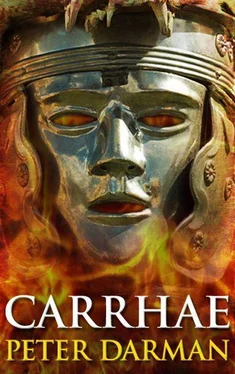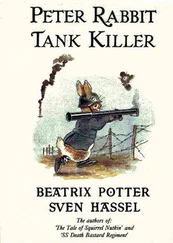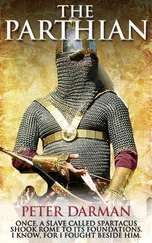Peter Darman - Carrhae
Здесь есть возможность читать онлайн «Peter Darman - Carrhae» весь текст электронной книги совершенно бесплатно (целиком полную версию без сокращений). В некоторых случаях можно слушать аудио, скачать через торрент в формате fb2 и присутствует краткое содержание. Год выпуска: 2013, Жанр: Исторические приключения, на английском языке. Описание произведения, (предисловие) а так же отзывы посетителей доступны на портале библиотеки ЛибКат.
- Название:Carrhae
- Автор:
- Жанр:
- Год:2013
- ISBN:нет данных
- Рейтинг книги:3 / 5. Голосов: 1
-
Избранное:Добавить в избранное
- Отзывы:
-
Ваша оценка:
- 60
- 1
- 2
- 3
- 4
- 5
Carrhae: краткое содержание, описание и аннотация
Предлагаем к чтению аннотацию, описание, краткое содержание или предисловие (зависит от того, что написал сам автор книги «Carrhae»). Если вы не нашли необходимую информацию о книге — напишите в комментариях, мы постараемся отыскать её.
Carrhae — читать онлайн бесплатно полную книгу (весь текст) целиком
Ниже представлен текст книги, разбитый по страницам. Система сохранения места последней прочитанной страницы, позволяет с удобством читать онлайн бесплатно книгу «Carrhae», без необходимости каждый раз заново искать на чём Вы остановились. Поставьте закладку, и сможете в любой момент перейти на страницу, на которой закончили чтение.
Интервал:
Закладка:
Alcaeus, ignoring the danger to his own health, attended her and administered medicines while Claudia spread charms around our bedroom and recanted spells to save her mother. I knew that it was all in vain as my wife’s eyes became swollen and red and her voice hoarse. Coughing fits wracked her body and vomiting fits weakened her. I stayed with her day and night, wiping the sweat from her body as a burning fever coursed through her. The servants, those who still lived, were frightened by her appearance as her beautiful blonde hair fell out and the smell of death filled our bedroom. On the fifth day after she had fallen ill Gallia died as I cradled her in my arms. A week later Eszter also succumbed to the plague.
By the time the pestilence had passed it had claimed a third of Dura’s citizens and hundreds of the army’s soldiers. The city and trade slowly recovered but the army never did. I was still king but handed over the day-to-day affairs of the kingdom to Claudia, who had declared that she would marry no man and rejected the advances of a stream of suitors who made their way to the city, all intent on becoming the husband of the daughter of Pacorus of Dura. All their efforts were in vain and as the years passed they stopped coming and the sharp-tongued Claudia became Dura’s ruler. She surrounded herself with mystics and sorcerers and gradually the army was reduced in size. The legionary camp was abandoned as the Durans and Exiles became mere shadows of their formers selves and eventually became nothing more than a city garrison. It was a sad end for two such prestigious fighting units but the regions around the kingdom were at peace and I was too old to lead them now. The cataphracts were similarly reduced to half their former strength and the horse archers numbered barely a dragon. They garrisoned the forts that dotted the kingdom but were more a force for maintaining order than fighting wars.
Not that there were any wars to fight because, despite Phraates’ scheming and cruel nature, even he recognised that the empire would be best served by peaceful relations with its neighbours as opposed to eternal conflict. The young man who had defeated Mark Antony and his Egyptian queen became emperor of the whole Roman Empire. He was called Caesar Augustus. He promised peace in return for the eagles that we had captured at Carrhae being sent back to Rome.
In a surprising act of courtesy I received a letter from Phraates asking whether I would be amenable for the trophies to be surrendered to the Romans. After the battle they had been distributed among the great temples of the empire — at Hatra, Uruk, Babylon, Seleucia, Esfahan and Susa — so he could have ordered them to be sent to him at Ctesiphon without consulting me. I replied that I had no objection but reminded him that one of the eagles resided in Palmyra, having been given to Haytham by Spartacus. Haytham had died many years before, ironically peacefully in his tent, and his son, Malik, had also passed away. A cold, cunning individual named Fatih, meaning ‘conqueror’, who was actually not unlike Parthia’s high king in character, though I neglected to mention that in my reply, now ruled the Agraci. But I did write that he was unlikely to surrender the eagle that the Agraci possessed. However, I had underestimated Phraates because he sent a courier back to Dura stating that he realised the Agraci had one of the eagles but this could be compensated for if I was willing to agree to the Romans being given the eagle that I had taken nearly fifty years ago and which resided in the Great Temple at Hatra.
‘He well and truly duped you,’ said Claudia scornfully as we sat on the palace terrace watching the sun go down in the west. ‘He has poison in his veins. You should say no to his request.’
But I was old and tired and cared little for relics of a bygone age. ‘To what end?’
Her eyes flashed with mischief. ‘To annoy him, of course, and remind him that what he seeks to surrender cheaply was bought dearly with Parthian blood.’
I smiled at her. ‘You get more like your mother every day. I will reply that I will authorise King Pacorus of Hatra sending my eagle to Ctesiphon.’
She sneered. ‘Give me the letter once you have finished with it. I will attach a curse to it that will rot Phraates’ innards.’
‘You will do no such thing,’ I rebuked her. ‘It is my decision.’
‘The Pacorus of old would have refused to bow down to the Romans.’
I smiled at her. ‘And now I am old Pacorus and too frail to bow down to anyone, and in any case we have Romans living in Dura now.’
‘That is entirely different,’ she snapped in irritation.
But I was not to be swayed and so Phraates sent back the eagles and Parthia entered into a peace treaty with Rome. In the aftermath I received a very courteous letter from Caesar Augustus himself inviting me to Rome where I would be awarded the honour of addressing the Senate. I replied that though I was very touched by his kind invitation, I was now too old to make the long journey to Rome.
It was a most curious thing. I had spent my life either fighting Romans or making preparations to battle them but now we had them in Dura, merchants mostly, all making a handsome living from the trade that the city attracted. Some became wealthy and bought a mansion in the city, moving their families and slaves into Dura, though they adopted Parthian dress and after a while it was difficult to tell who was a native and who was a foreigner. No that it mattered; everyone was free to come and go as they wanted as long as they obeyed the law and paid their taxes.
Their wealth paled beside that of the man I had first known as a Cappadocian pot seller who had turned his hand to scouting. Byrd died one of the richest men in Parthia and Arabia, the owner of a vast transport system that used thousands of camels and mules to convey goods throughout the western part of the Parthian Empire, Agraci lands, Syria, Judea, Egypt, Cilicia and Cappadocia. He was courted by Roman governors, Egyptian pharaohs and Parthian kings but continued to live a simple life and had the appearance of a struggling travelling salesman to the day he died. I was at Palmyra when he suddenly fell ill and was taken to his tent. I held a sobbing Noora when he passed away. That was ten years ago now but it seems like yesterday.
Curiously, though I had been one of their most intractable foes, the Romans in Dura and Syria also sought my company. I received many invitations to be the guest of rich and powerful Romans but because it meant travelling far and wide I politely declined most of them. One invitation I did accept was from the Roman governor of Syria, one Marcus Vipsanius Agrippa, a serious man with thick curly hair who had been instrumental in winning a great naval battle at a place called Actium that had secured the rule of his friend Caesar Augustus.
Claudia gave me two companies of cataphracts as an escort and the stables supplied a very docile mare for me to ride, not that I did much of that as my leg made sitting on a horse for long periods extremely painful. She also insisted that half a dozen squires attended me and gave strict instructions to the commander of the escort that I was to ride for only two hours at a time. But that journey to Syria was one of the happiest in my dotage. The cataphracts and their horses wore scale armour and pennants fluttered from every kontus . Every day the squires helped me into my leather cuirass and I wore my Roman helmet with a magnificent white goose feather crest once again, and at my hip I carried the spatha that had been gifted to me by Spartacus. And suddenly I was once more Pacorus of Dura as my griffin standard fluttered behind me and the sun glinted off whetted lance points. During the journey I thought I heard the steady tramp of thousands of hobnailed sandals on the sun-roasted earth behind me and on the horizon saw the fleeting shapes of black-clad scouts riding far ahead of the army led by Byrd and Malik. But then a gust of wind brought me back to reality and I saw my withered hands and felt the ache in my leg and knew that those days were long gone. Foolish old man.
Читать дальшеИнтервал:
Закладка:
Похожие книги на «Carrhae»
Представляем Вашему вниманию похожие книги на «Carrhae» списком для выбора. Мы отобрали схожую по названию и смыслу литературу в надежде предоставить читателям больше вариантов отыскать новые, интересные, ещё непрочитанные произведения.
Обсуждение, отзывы о книге «Carrhae» и просто собственные мнения читателей. Оставьте ваши комментарии, напишите, что Вы думаете о произведении, его смысле или главных героях. Укажите что конкретно понравилось, а что нет, и почему Вы так считаете.












